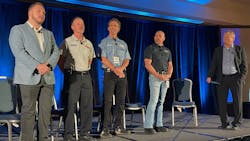ToolTech 2022: Repair shop owners discuss recent industry trends
Ben Johnson, director of product management for Mitchell 1, moderated a panel discussion with repair shop owners during the Equipment & Tool Institute’s (ETI) ToolTech conference, held recently at the Coronado Island Marriott in Coronado, Calif. The 75th-anniversary event brought together thought leaders in the automotive repair industry to discuss current trends and how suppliers can best serve the repair community.
“I was honored to serve as the moderator for a lively discussion with repair shop owners as we dove into a number of hot industry topics, including the impact that ADAS and electric vehicles are having on shop businesses, the types of repairs that they are seeing now versus 10 years ago, and other new technologies that are here or on the horizon,” said Johnson.
The panelists included Brian Bowersock, Keith Benline, and Randy Waitman, owners of automotive repair shops in the San Diego, Calif. area. They have over 100 years of combined experience in vehicle repair and running successful businesses. The panel also included Lucas Underwood, president of L&N Performance Auto Repair in Blowing Rock, NC.
A common theme during the panel discussion was, “Educate and inform us and we’ll be fine.” The California-based repair shops stated they are already seeing a number of electric vehicles and technicians are trained and able to work on them. However, they noted that companies such as Tesla, while being the most popular EV on the road, has limited options for access to repair information and parts.
The panel pointed out that traditional brands have information and parts readily available, but they are concerned that if companies like Tesla, Rivian, and other newcomers don’t make their information available through providers such as Mitchell 1, there will be a long-term impact as these vehicles continue to rise in popularity and age.
Another topic of the panel discussion was the increase in ADAS-equipped vehicles. One shop owner said they will be adding ADAS calibration capabilities in-house, while the other shop owners cited how expense, low volume, and space requirements are driving them to “hub and spoke” relationships with shops that have the space and equipment to perform these calibrations.
“The resounding message from the panel discussion was that the shop owners need to know what’s coming to their bays and when, as well as the need for service information and training for these new technologies,” said Johnson. “They recognize the expense of new tools and equipment, but it must be reasonable for them in order to continue effectively serving their communities.”
This article originally appeared on VehicleServicePros.com.
